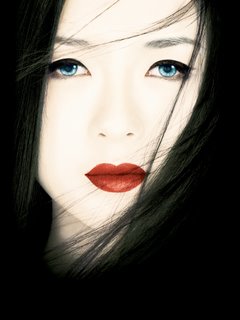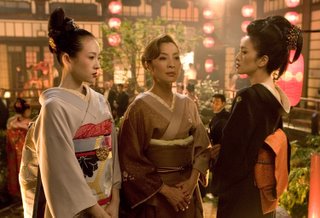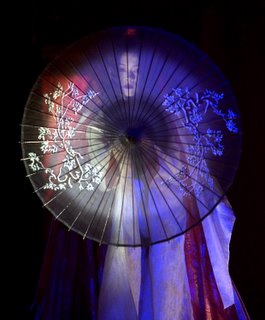


The Politics of Racial Casting
-- "Memoirs of a Geisha" and American movies on Asia
By Andrew C.C. Huang
Contributing Writer
(This article originally appeared in Taiwan News on Friday, January 13, 2006)
So, what’s race gotta do with it? Well, everything. And exactly how far is “Memoirs of a Geisha” situated from “The World of Suzy Wong”? Pretty close.
“The World of Suzy Wong” is a 1960 American movie adapted from a novel written by a Caucasian male writer (Richard Mason). Directed by a Caucasian male director (Richard Quine), the movie traces the mysterious and mythical private life of an Asian prostitute and her love affair with a man.
“Memoirs of a Geisha” is a 2005 American movie adapted from a novel written by a Caucasian male writer (Arthur Golden). Directed by a Caucasian male director (Rob Marshall), the movie traces the mysterious and mythical private lives of three Asian prostitutes and their love affairs with men.
Luckily, the men have changed from Caucasian male to Asian male this time. So, from this moment on, Asian male is born in America cinema.
Race, nationality, gender, sexuality…etc. Forever the hot-button topics in popular culture, an art form supposed created for the class free new world of democracy since the birth of 20th century.
The recent controversy over the decision to cast three Chinese stars – Zhang Ziyi, Gong Li and Michelle Yeoh – as the three central characters in the movie “Memoirs of a Geisha” produced by Steven Spielberg causes the latest hoopla in cinematic international or interracial casting.
While the Japanese public have expressed discontent over the movie director Rob Marshall’ decision to pass over all Japanese actresses and choose three Chinese stars to portray the three Japanese Geishas in the movie, some audiences in China have criticized and labeled actress Zhang Ziyi as a “national traitor” for portraying Japanese characters in “The Princess Racoon” and “Memoirs of a Geisha” back to back. The hostility between China and Japan since World War II certainly does not help when any Japanese or Chinese actor appear in the other nation’s movies.
While director Marshall has claimed that he chooses the three Chinese actresses to portray the three main Geisha roles in “Memoirs of a Geisha” based “purely on the actresses’ ability and their suitability to the roles,” it’s blatantly obvious to the public that Marshall’s casting decision is based on the three Chinese stars’ bankable prowess rather than their suitability to the roles.
While Zhang Ziyi, Gong Li and Michelle Yeoh are currently the three most powerful Asian female stars in the world right now, Japan has thus far failed to produced any internationally recognized female star. The logic does not flow that no Japanese actress in the world are capable of portraying the three Geisha roles better than Zhang, Gong and Yeoh --- all three of them are unversed to Japanese cultures, not to mention the highly specialized art form of Geisha culture.
With the pedigree of Steven Spielberg and Rob Marshall of the Oscar-winning “Chicago” fame, the anxiously anticipated “Memoirs of a Geisha” came slowly expected as the second cinematic Messiah since the landmark “The Last Emperor” two decades ago. However, as director Marshall’s biased casting became so naked to the public, “Memoirs of a Geisha” is slowly edging towards the second “The World of Suzy Wong,” a landmark disgrace rather than celebration of Asian culture.
Taiwan’s local media has jeered at the movie as “an eye candy to American eyes and a confused mixed race movie” because “director Marshall obviously thinks all Asians look the same anyway and there is no difference between a Chinese and a Japanese actors to him.”
Despite all these criticisms and counterattacks, the controversy surrounding “Memoirs of a Geisha” seems overheated in the end. International casting and interracial casting are decidedly of extreme different natures. It’s true that Marshal has snubbed all Japanese actresses in favor of three Chinese international female superstars. However, in the world of mainstream Hollywood business, the common practice of casting a bankable star instead of a more suitable and honed actor is hardly a secret.
Chinese American actress Lucy Liu, who is born and raised up in Queens bourough of New York City, was widely criticized by the non Chinese Asian-American groups for taking the role of the Japanese gangster queen O-Ren Ishii in Quentin Tarantino’s blockbuster “Kill Bill” series. In an interview with the New York Times, Liu defended her choice by stating: “it’s hard enough for an Asian actor to find good roles in Hollywood. It’s unfair to criticize me for portraying a Japanese character simply because I am Chinese. It’s very limiting for the actors. I think I should be allowed to portray Chinese, Korean, Japanese, Vietnamese or even an Italian in movies.”
Indeed, international casting among Caucasian actors has never been an issue. Nicole Kidman, an Australia born actress and the current reigning goddess in Hollywood, has portrayed Caucasian characters of numerous nationalities with her long body of work including “Batman Forever” (American comic book character), “The Portrait of a Lady” (19th century American), “Moulin Rouge” (French character in an English-language movie) “The Hours” (British famed writer) and “Cold Mountain” (American lady during the Civil War), and “The Interpreter” (blond Caucasian born and raised in South Africa).
As Hollywood has been the movie center of the world for more than a century, importing non-American talents into Hollywood to portray roles of different nationalities and race has never been news. Greta Garbo, the Sweden born actress, took the title of Hollywood’s reigning queen from the 1920’s to 1940’s. Marlene Dietrich, a German born actress, also shined in Hollywood from 1930’s to 1950’s as another cinematic diva.
Among the English speaking world, international casting is a time honored common practice. The current era of Hollywood superstars include at least Nicole Kidman (Australian), Russell Crow (Australian), Cate Blanche (Australian), Johnny Depp (Canadian), Daniel Day-Lewis (British), Ralph Fiennes (British), and Charlie Theron (South African). All of these non-Americans stars have portrayed a wide range of Caucasian characters of different nationalities in their careers.
At the very least, actors are not allowed to wear makeup of different colors in order to portray characters of different races anymore.
The title of the most disgraceful and blasphemous movie casting should go to “The Good Earth” in 1937. Adapted from Pearl S. Buck’s Nobel-winning novel of the same title, the movie recounts the story of a farmer family’s struggle for survival in turn of the 20th century China. Director Sidney Franklin made the decision that no Chinese actors are capable of handling the major roles. Franklin opted to cast Paul Muni as the farmer Wang Lung, Louise Rainer as the wife O-Lan, Walter Connolly as the uncle, Tilly Losch as Lotus, Charley Grapewin as the old father, Jessie Ralph as Cuckoo, and relegated all the Chinese actors to minor supporting roles. Even as a black-and-white movie, all the principle Caucasian actors had ashen their skin by wearing dark-toned makeup. German American actress Louis Rainer even won an Oscars for Best Actress award for her portrayal of the Chinese farmer wife (Gulp!).
As Chinese stars have become the first batch of non-Caucasian actors to move into mainstream Hollywood and the international movie market, it seems inevitable that the current crop of Chinese superstars – Chow Yen Fat, Jackie Chan, Jet Li, Maggie Cheung, Tony Leung and the three female stars in “Memoirs of a Geisha” – will take up most of the Asian roles in mainstream Hollywood movies until the other Asian nations produce their own international superstar.
With political correctness and protest from different consumer demographics growing ever strong as a serious issue in Hollywood – whose first cardinal is to make profit and stay afloat – the convoluted cross-racial casting of “The Good Earth” might have become an odd, quant and curious ancient cinematic artifact of a bygone era.
However, international casting within the same race is not the monopoly of Hollywood either. As the different movie segments are slowly merging into one global market, Asia has been taken a lesson from Hollywood and has been cranking out blockbusters based on international casting.
A decade ago, even casting Chinese actors from China, Hong Kong and Taiwan into the same movie was considered unimaginable. However, Ang Lee’s watershed movie “Crouching Tiger, Hidden Dragon” invented the ideas that a Taiwanese actor (Chang Chen), a China actress (Zhang Ziyi), a Hong Kong star (Chow Yen Fat) and a west-educated Malaysian Chinese (Michelle Yeoh) could portray characters in a kungfu movie set in China’s Qing dynasty even with their four different accents.
Since then, it was the point of no return. Any movie with the ambition to conquer the pan Asia or the international market would pull stars from different regions and nations.
Zhang Yimou’s followed suit with “Hero” by casting Maggie Cheung (Britain educated Hong Kong Chinese), Tony Leung (Hong Kong star), Jet Li (China star), Zhang Ziyi (China star) and Donnie Yen (Chinese American) into the same movie. Zhang pulled the same trick again by gathering Zhang Ziyi, Andy Lau (Hong Kong star) and Takashi Kaneshiro (Taiwan/Japan mix blood) for “House of Flying Daggers.”
Hong Kong kungfu master Tsui Hark went for the same strategy by casting Donnie Yen, Leon Lai (Hong Kong star), Charlie Yeung (Hong Kong star), Duncan Lai (Chinese American), Dai Li-wu (Taiwan actor), Kim So-yeon (Korean star), Zhang Jingchu (China actress) and Michael Wong (Chinese Spanish mix blood and Asian American) into last summer’s kungfu blockbuster “Seven Swords.” In order to incorporate the bankable Kim So-yeon (who does not speak Chinese) into the movie, Tsui especially writes a role of a Korean slave girl for Kim.
Still not enough? (Of course, it’s never enough) In movie business, more means more and much MUCH more.
For China master Chen Kaige’s kungfu fantasy blockbuster “The Promise” released this past December, Chen casted Jang Don-jan (Korean superstar), Hiroyuki Sanada (Japanese superstar), Cecilia Cheung (Hong Kong star), Nicholas Tse (Hong Kong star), Chen Hong (China actress) and Liu Ye (China actor) into one Chinese-language movie. How did director Chen pull off the language problem this time? He ordered both Jang and Sanada to memorize the pronounciation of their Chinese dialogues word by word.
Hong Kong art-house director Yonfan -- who is known for his gorgeously shot and emotionally touching films such as “Beauty,” “Peony Pavilion” and “Color Blossoms” – expresses his opinion on international casting. “When I was doing the casting for ‘Peony Pavilion,’ it took me a long time to settle on the actresses,” says Yonfan. “For the role of Cui Hua, I considered all the actresses in China, Hong Kong and Taiwan and could not zero in on anyone who fits this role. All these actresses are either of the wrong age or of the wrong quality required by the character.”
“In the end, I decided to ask my friend Sylvia Cheung for opinions. She asked me a very simple question, ‘if language is not a problem, which Asian actress would you consider to be the ideal person to portray that role?’” Yonfan explains. “I thought about it for a while and answered that Japanese actress Rie Miyazawa would be my dream choice if she speaks Chinese. Sylvia told me to just go for Miyazawa.”
Yonfan did hire Miyazawa for “Peony Pavilion,” a movie about a triangle between a man and two lesbian lovers set in early Republic China. For the sake of preserving the actress’s natural emotions, Yonfan opted to have Miyazawa speaks Japanese during the shooting and then have all of her dialogues dubbed into Chinese during the post-production. With her understated and heart-felt performance, Miyazawa managed to beat her superstar co-star Joey Wong to win the Best Actress Award at Moscow International Film Festival.
So, how far is “Memoirs of a Geisha” situated from “The World of Suzy Wong”? Well, very far.
After nearly half a century, Hollywood has certainly learned its lesson and transformed itself. As a soulless and fun-loaded popcorn movie, “Memoirs of a Geisha” boasts three times the diva power than the lonely Suzy Wong and three times the entertainment. With the three prima donnas Geishas Zhang, Gong and Yoeh aboard, there’s catfight (spectacular face slapping, extravagant hair pulling, breath-taking female wrestling scenes, over-the-top personal verbal attack, scheming and calculation that rivals national security matters) aplenty to keep the audiences riveted throughout the whole movie. And, above all this, hallelujah, the Asian male is finally born in America cinema.

Comments